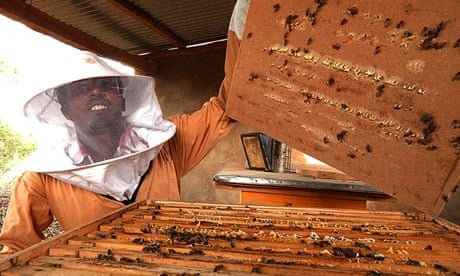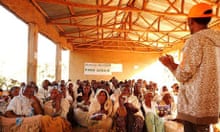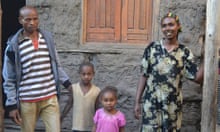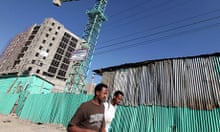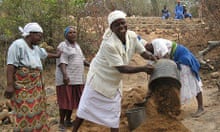In the Tigray region of northern Ethiopia, increasing numbers of young people have no access to the land and its resources. Farming land here is already scarce, and many farms are very small. Many young people risk their lives by migrating to countries in the Middle East to work in domestic servitude, while others are resigned to living in extreme poverty.
With no opportunities to work close to home, Gebre Egzaibher, 21, felt forced to take a dangerous job as a traditional gold miner close to the Eritrean border. He would stand for 18 hours a day in a river bed panning gold deposits for the equivalent of a £1 a day, and contend with occupational hazards, such as being shot at by Eritrean militias.
"I had no choice. My father was sick and my younger brothers and sisters had only one meal a day. I needed to work to support them," he says.
As life expectancy increases the potential for sub-dividing plots of land reduces, leaving many of Ethiopia's young people with no assets and limited employment opportunities.
The issue of landless youth is fast becoming a national crisis in Ethiopia where 30% of young people are unemployed.
In Gebre's hometown of Sero Tabia, where 2,200 families live, 560 young people are unemployed and have no access to land for earning a living.
The prospect of earning money in Middle Eastern countries as a domestic maid or as a construction worker has spurred many young Ethiopians overseas. But for some the dream has become a nightmare as employers exploit them and ignore their rights.
Last month, the Ethiopian government ordered the repatriation of more than 130,000 young Ethiopian migrants illegally working in Saudi Arabia and placed a travel ban on workers going to the region for six months.
To help mitigate this crisis of land scarcity and spiralling youth unemployment, Farm Africa, an NGO, which has directors based in Addis Ababa, Nairobi and Dar es Salaam, has begun supplying beehives to 200 landless young people in the Tigray region to give them a resilient means of making a living.
Gebre smiles as he proudly puts on his bee-keeping protective clothing for the first time and delicately removes the roofs from two beehives to inspect his new bee colonies.
"I am very happy today because I know these bees will help improve my future security and give me what I never thought possible – hope," he says.
In his first year Gebre expects to sell 16kg of white honey after keeping 15% of his harvest for household and nutritional purposes. He stands to earn £150 a year and has the option of increasing production by splitting the bee colonies.
Farm Africa's £31,000 intervention has a ripple effect that will set multiplying numbers of landless youth in Tigray on the honey trail says Farm Africa's project co-ordinator, Desta Araya.
Ethiopia is Africa's largest honey consumer and producer. The white honey produced in the Tigray region is widely regarded as a national delicacy and is in high demand across the country.
Young landless families in Tigray suffer high levels of poverty and malnutrition. Women in the region suffer in particular from poor nutrition and a recent survey showed that nearly a third were underweight, while more than half of the children under-five were affected by stunted growth.
Letebrahane Gebreegizeabre, 28, struggled to feed her family of four, earning just £1.25 a day as a farm labourer. This was just enough to feed her children a single daily serving of injera, a sour pancake.
This year, Farm Africa gave her two beehives. "With my additional income from selling honey I will save enough money to buy a sheep, a goat and more bee hives," she says. "I look forward to supporting my family with three meals a day and giving my children an education."
The issue of land access has become a critical challenge for unemployed youth in rural Tigray. Land degradation, erratic rainfall and a national population that is expected to jump from 90 million to an estimated 278 million by mid-century makes the issue of land access seem insoluble.
But small acts can have big effects; Farm Africa's beekeeping programme gives young people an opportunity to build their own businesses and reduce their dependency on diminishing land access. With the support of Guardian readers, Farm Africa can continue to change the lives of young people.
